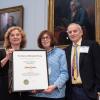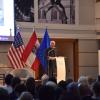
IIASA Scientific Advisory Committee member, Elke Weber, has received the Patrick Suppes Prize of the American Philosophical Society, the oldest learned society in the USA, for her work on advancing the understanding of how people make important decisions in real-world environments.
Weber’s research seeks to understand the factors people use to interpret risk and make decisions under uncertainty, revealing that people frequently violate the common assumption that they always make rational choices based on data alone. She uses information about human behavior and psychology to design decision environments that recognize the limitations of human decision makers and account for the full range of human decision-making processes, with the goal of encouraging decisions that increase global wellbeing, justice, and sustainability.
She has often applied her work to address energy and environmental policy challenges, providing insights from behavioral science to help inform decision makers and policymaking bodies. Her past research has uncovered widespread yet underestimated support for climate policy among the American public, gauged public perceptions of emerging technologies such as carbon capture and sequestration, and revealed how the carbon footprint of climate communicators can help or hinder their perceived credibility.
In presenting the award to Weber, Richard Shiffrin, the chair of the selection committee and the Luther Dana Waterman Professor of Psychological and Brain Sciences at Indiana University, said, “Dr. Weber is one of the world’s most respected decision scientists, and her research is marked by her desire to help society by helping people make wise decisions in real-world settings. Dr. Weber’s research aligns perfectly with the mission of the American Philosophical Society of promoting useful knowledge.”
Weber joined Princeton University in 2016, where she leads the Behavioral Science for Policy Lab (BSPL). Additionally, she serves as the associate director for education at the Andlinger Center for Energy and the Environment and as director of the Fung Global Fellows Program. She joined Princeton from Columbia University, where she was the Jerome A. Chazen Professor of International Business at Columbia Business School and founded the Center for Decision Sciences and Center for Research on Environmental Decisions. Weber earned a PhD and MA in Psychology from Harvard University and a BA in Psychology from York University in Toronto, Canada.
She has received many awards and honors for her work. In 2020, she was elected as a member of the National Academies of Sciences, and in 2018, she was named a fellow of the American Association for the Advancement of Science. She is also a fellow of the American Academy of Arts and Sciences, a member of the German National Academy of Sciences (Leopoldina), and has held leadership positions in a number of professional societies.
Established in 2006, the Patrick Suppes Prize honors accomplishments in three scholarly fields, with the prize rotating each year between philosophy of science, psychology or neuroscience, and history of science.
Adapted from a news article originally published on the Princeton University website. Read the original article here.
News

14 June 2024
IIASA Leadership visits Washington DC

13 June 2024
Professor Karen Lips appointed as IIASA Deputy Director General

23 April 2024
